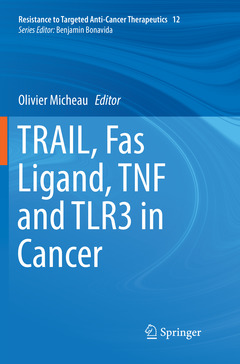Description
TRAIL, Fas Ligand, TNF and TLR3 in Cancer, Softcover reprint of the original 1st ed. 2017
Resistance to Targeted Anti-Cancer Therapeutics Series, Vol. 12
Language: English
Subject for TRAIL, Fas Ligand, TNF and TLR3 in Cancer:
Keywords
Publication date: 08-2018
Support: Print on demand
Publication date: 07-2017
Support: Print on demand
Description
/li>Contents
/li>Biography
/li>Comment
/li>
This volume provides the current understanding of death receptor's/TLR3 signaling regulation in cancer. Death receptors, including TRAIL-R1, TRAIL-R2, Fas and TNF-RI, owing to their ability to trigger apoptosis and to contribute to the elimination of cancer cells by the immune system have been considered, to variable extent, as important therapeutic targets for cancer therapy. But an increasing body of evidence suggests that some of these receptors may also contribute to tumorigenesis, or that new players such as TLR3 may be targeted for cancer therapy due to their ability to behave like death receptors.
Provides an up-to-date overview of TNF family signal transduction with a special emphasis on TRAIL and Fas L
Deals with cell biology, immunology and oncology and in particular drug-resistance mechanisms, as well as prometastatic potential, related to the cell biology of the downstream signaling components of the TNF superfamily
Addresses how post-translational modifications of TNF related members or their cleavage by proteases affect their signaling capacity
Includes supplementary material: sn.pub/extras




